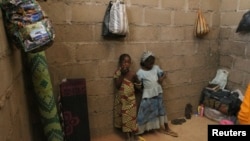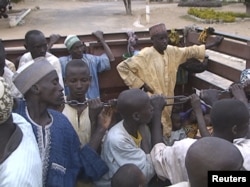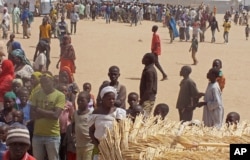The militaries of Cameroon and Nigeria have freed hundreds of hostages held by Boko Haram, including dozens of girls and women either forcefully married or held as sex slaves.
The captives were freed after raids on the town of Achigachia, which straddles Cameroon and Nigeria. VOA was able to talk to several of them.
Speaking in Kanouri, a language spoken in northern Cameroon and northeastern Nigeria, Aisha Moussa said that after her parents asked her to get married at age 14 last year, her husband took her to the Sambissa forest, a stronghold of Boko Haram situated on the Cameroon-Nigeria border.
She said that while she was there, her husband led a group of motorcycle riders who transported Boko Haram fighters to steal, kidnap and kill in cattle ranches, farms and markets, both in Cameroon and Nigeria.
Surrendered to troops
Moussa said that in the forest, many girls, some younger than she, who served as sex slaves for unmarried Boko Haram fighters. She said that after one year in the forests, the couple's living conditions were getting worse and their lives were threatened by frequent raids by the military. They decided to escape, and the opportunity came when Cameroon and Nigerian forces attacked. They surrendered to the troops.
After they were freed, Cameroon's military took Moussa's husband to an unknown destination and asked that she be transported to the Minawao refugee camp in northern Cameroon.
Shakaria Habiba, 42, said she was forced out of her marital home in Achigachia by 15 heavily armed men, as were dozens of other women and girls. She said she spent 10½ months with Boko Haram fighters in a bush area she could not identify. Habiba said that while there, she was buried up to her waist for 20 days as punishment for being a Christian. She said she was later given as the fourth wife to a Boko Haram Muslim.
Habiba, who arrived at the Minawao refugee camp with a 3-month-old baby, said there were hundreds of Cameroonian and Nigerian girls in the Boko Haram hideout doing household chores and used for sex by the fighters. She said those who become pregnant were handed over to traditional birth attendants.
In 2013, Nigeria reported that Boko Haram had stepped up kidnappings of young women to sell them into sexual slavery or force them to marry its fighters. The tactics attracted international outrage, but efforts to prevent more kidnappings or rescue the young girls were not successful.
The hundreds of schoolchildren kidnapped from a Nigerian school in Chibok have not been found.
Practice widens
The practice spread to Cameroon in 2014 when the military announced a number of young girls on its border with Nigeria had been taken for marriage by Boko Haram fighters.
Lieutenant Colonel Felix Tetcha, one of Cameroon's senior military officers fighting the insurgency, said Boko Haram again engaged in the practice after its ability to fight was weakened by military raids on the militants' strongholds that began in December. He said Boko Haram now prefers to psychologically torment the population.
Cameroon said it was handing over the rescued girls and women to specialized U.N. agencies for psychological care.
The United Nations says Boko Haram's six-year insurgency has killed more than 20,000 people and displaced more than 2.5 million.






